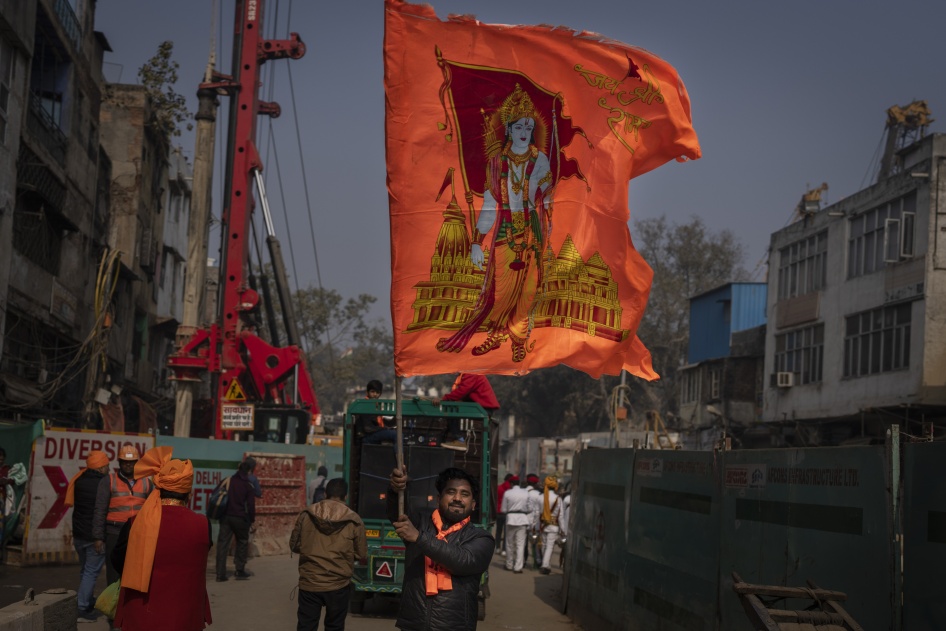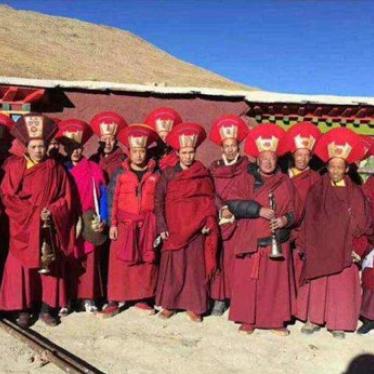(New York) – Indian authorities should urgently act to prevent further escalation in communal violence following the consecration of a controversial Hindu temple in Uttar Pradesh state on January 22, 2024, Human Rights Watch said today. Hindu processions that day led to sectarian clashes as well as incidents of vandalism, threats, and assault against Muslims and other religious minorities in several parts of the country.
Prime Minister Narendra Modi, who led the temple inauguration, had warned that those celebrating the temple should “show faith, not aggression.” However, as thousands of supporters of Modi’s Hindu nationalist Bharatiya Janata Party (BJP) joined cavalcades of vehicles across the country and shouted the slogan “Jai Shri Ram,” endorsing the god Ram, communal skirmishes broke out in a number of states including in Karnataka, Gujarat, Uttar Pradesh, West Bengal, Madhya Pradesh, Kerala, Maharashtra, and Telangana.
“Prime Minister Modi’s explicit instructions against aggression often went unheeded, a casualty of violence emboldened by longstanding impunity, political patronage and protection,” said Elaine Pearson, Asia director at Human Rights Watch. “Indian authorities need to take stronger action to end human rights abuses by Hindu militants.”
The most concerning incidents occurred in Maharashtra state, where a coalition government that includes the BJP took office in June 2022. In the Mira Road suburb of the state capital, Mumbai, arguments between Hindu men participating in a temple procession and Muslim residents soon flared into violence. The police arrested 13 men allegedly implicated in the violence.
Muslim witnesses said that in the evening before the temple inauguration, brawls broke out when Hindu mobs chanted slogans while brandishing sticks and swords in front of a mosque. When a militant Hindu mob returned to the same area on January 23, pelting stones and attacking shops, the police did little to control them. “The police are defending only one side,” Azeemuddin Sayed, a local social worker, told Human Rights Watch. “They should protect everyone. Or will they only protect based on religion?”
Abdul Haq Chaudhary said that the mob attacked his son and two workers, and damaged his vehicle. “They asked my son to chant ‘Jai Shri Ram,’ and when he refused, they started beating him,” Chaudhary said. He said that the mob attacked after they identified their vehicle as Muslim-owned as it had Islamic symbols. Chaudhary said he had filed a complaint, but the police had yet to make any arrests. “We have all the information. But the police are making excuses and saying they cannot spot anyone in the CCTV footage.”
After the Mira Road violence, the municipal authorities brought in bulldozers to demolish alleged illegal structures, most of them belonging to Muslims, that had been standing for decades. Local activists alleged that the government actions resulted in summary and collective punishment against Muslim residents.
Even as Prime Minister Modi declared on January 22 that the Ram temple was “a symbol of peace, patience, harmony and coordination in Indian society,” over a dozen instances of violent clashes were recorded across several Indian states. Many followed a similar pattern of young Hindu men displaying aggression, publicly brandishing sticks, swords, and in one case a gun. Violence did not escalate after the police intervened, showing that when ordered to do so, law enforcement can act in a rights-respecting manner, Human Rights Watch said.
A Muslim woman in Mumbai alleged that men chanting “Jai Shri Ram” harassed her on the streets. In Karnataka state, police arrested four men after a 17-year-old Dalit boy was assaulted and forced to say “Jai Shri Ram” for insulting Hindu gods because he had included a photo of the Dalit leader Bhimrao Ramji Ambedkar on his WhatsApp status. Hindu mobs in Bihar celebrating the temple consecration allegedly set ablaze a Muslim cemetery.
In Uttar Pradesh, police arrested 11 people after the caretaker of a Mughal-era mosque in Agra complained that members of a Hindu procession forcibly placed saffron flags – symbolic of Hinduism – on the structure. In the state’s Sant Kabir Nagar district, police arrested five local residents who allegedly tried to enter a mosque twice while celebrating the temple consecration in a procession on January 22. In Telangana state, Muslim residents filed a police complaint after members of a Hindu procession allegedly threw shoes and papers at a mosque.
In some places, the violence followed confrontations between local Muslim and Hindu residents. In Gujarat, some threw stones when members of a Hindu procession lit firecrackers and played loud music in a Muslim neighborhood. In Telangana’s Sangareddy district, mobs set a shop on fire after an argument in which someone threw a shoe at the Hindu procession. In Panvel, Maharashtra, a scuffle ensued in a Muslim-dominated neighborhood after local residents confronted men chanting “Jai Shri Ram.” In Nagpur district, a brawl ensued between local Muslim residents and Hindu men celebrating the consecration. A communal clash in West Bengal on January 24 left at least 14 people injured.
The consecration of the Ram Temple in Ayodhya is widely seen as a culmination of Hindu majoritarian and political demands led by the ruling BJP and its affiliates. The temple was constructed around the site where the 16th century Babri Mosque stood until a Hindu mob demolished it in 1992. Many Hindus believe that the mosque had been built on the ruins of a previous temple marking the birthplace of the Hindu god Ram. Thousands died in religious clashes and riots across the country following the demolition.
Secular and liberal groups in India organized screenings of documentaries during the temple inauguration to recall the brutalities that had marked the campaign for its construction. Both the authorities and Hindu groups targeted the screenings. In Hyderabad, three people were arrested after members of a Hindu group filed a complaint and allegedly vandalized the screening, accusing its organizers of “creating a communal issue.”
In Kerala, a Hindu mob threatened students of KR Narayanan National Institute of Visual Arts and Sciences, and disrupted the screening of the same documentary on the evening of January 22. In Pune, several men chanting slogans entered the Film and Television Institute of India to protest the screening of a documentary criticizing the Ram temple movement, vandalized the premises, and attacked students.
The authorities should act immediately to stem the deteriorating human rights situation in the country, particularly for freedoms of religion, expression, and association, Human Rights Watch said. Ahead of elections slated for this year, it is crucial to address rising fears of violence and discrimination against India’s Muslims and other religious minorities.
“A political campaign that enables violent triumphalism harms governance, rule of law, and India’s reputation as a democracy,” Pearson said. “The authorities need to ensure that the law is enforced impartially, and not to the benefit of the ruling party’s supporters.”








